BLOOD ON THE NOTES
Jazz doesn’t just soothe’”it can bleed. Both acts happen throughout these 150 minutes, never more so than at the end. Paradise Blue brings the lyricism of Tennessee Williams, the glorious gab of August Wilson, and a hard-boiled, “film noir” tough love to an unrelenting tale of music, change, love, and death. The action lurches between a trumpet and a gun. A Midwest premiere from Chicago’s TimeLine Theatre, Dominique Morisseau’s harrowing period piece manages to go soft and stay hard simultaneously. Every kindness is dogged by unwitting cruelty. Its only innocence is in the jazz music (created by Orbert Davis) that’s heard too little.
Like the reclamation dramas of Chicago’s Black Ensemble Theater, this two-act time capsule from 1949 Detroit puts a price on music we prize too easily. Its crucial locale: The Paradise Club in a downtown strip called Paradise Valley. Formerly known as Black Bottom, this African-American enclave is abruptly up for development. Back then they called it “slum clearance.” Today it’s the more euphemistic “urban renewal.” In any case “progress” brings pain’”and director Ron OJ Parson detonates Morissseau’s volatile script with nary a misfire or false note.
In the middle of this post-war expulsion of an African-American community by white land grabbers (like New Orleans after Katrina) is the embattled title character. For five years Blue (Al’Jaleel McGhee, anguished and angry) has been the cheapskate owner of a once-famed jazz emporium. Now slightly seedy and down-on-its-luck, Paradise Club charges a then-whopping 75 cents for entry. Lacking a bassist (who quit because he demanded to be paid in advance), Blue’s Black Bottom Quartet is suddenly silent.
There’s trouble at the top: Blue is haunted by ghosts from a family horror story. He despises the “pipe dreams” of the lower-class blacks who are increasingly his only customers. He’s happiest soloing on his trumpet, though, as Corn puts it, he can’t achieve that perfect note that would open the gates of heaven. Instead Blue entertains an offer of $10,000 to sell out, a sale that would fatally destabilize a once-thriving neighborhood.
Blue’s sporadically paid, sometimes underfed, musicians are unhappy with the boss’s neglect and distractions. Hoping to turn things around, veteran jazz man Corn (genial Ronald L. Conner) remains loyal to a fault. Percussionist P-Sam (Charles Andrew Gardner, his nervous energy suggesting Sporting Life) just wants to play his drums and, though room is free, not pay for board. Doing all the hard work but happy to serve, Blue’s nurturing and tender-hearted girlfriend Pumpkin (a radiant Kristin E. Ellis) is a bad singer who Blue insists has talent. She’s content to savor poetry and endure his raw abuse. Wanting to stay because it takes time grow friends (which enrages Blue), Pumpkin sees his dying club as a “sanctuary” where the music mellows poor folks stuck in (constant) hard times.
Bringing events to a quick boil, the arrival of Silver (smoldering Tyla Abercrumbie), the new upstairs tenant, literally triggers tragedy. A femme fatale from Louisiana who shot her man and carries a silver pistol, this supposed voodoo priestess, a scarlet lady from Central Casting, trails scandal as well as expensive perfume. Silver instantly attracts interest and lust, particularly from lonely Corn whose wife died three years before. For suspicion-stirring reasons never made clear in Morisseau’s sometimes cryptic storytelling, she wants the club. Silver urges Blue to abandon his dream’”and, with it, the music that fights off his demons.
By the end Blue faces two courses’”Silver’s swan song of capitulation to land speculators as he cuts his losses or Pumpkin’s hope for unforced happiness, settling for simplicity.
Morisseau’s plot, it turns out, pushes too hard to allow any easy resolution or edifying outcome. At the very end, two gratuitous acts of loud violence leave the audience stunned at curtain call. We knew this wasn’t really “paradise”’”but, well, you’re never ready for payback this ugly.
For TimeLine’s first proscenium production, lighting and set designer Brian Sidney Bembridge creates an astonishingly convincing gin joint with distressed details abundant. As always, the TimeLine lobby is a treasure trove of old-time club posters, photos of lost buildings from Black Bottom, biographies of jazz greats, and contextual information about post-war Detroit’”one more labor of love from this history-loving company.
But the absolute authenticity is on this passionate stage. McGhee’s Blue breaks down scarily and savagely, a monstrous challenge to the palpable love of Ellis’s wondrous Pumpkin. Conner and Gardner richly convey the tangled lives of bop-and-blues players on the skids, living on gigs and hoping for glory. Abercrumbie takes the shopworn stereotype of the invasive temptress (here scorned and feared as a “spider”) and turns Silver into gold.
A valedictory for a vanished world, Paradise Blue is faithful to TimeLine’s urge to make the past the present. True to its times, Morisseau’s driven drama also comes perilously close to melodrama. The ending is a tad too conclusive, settling the play’s psychological and social crises soon and suddenly. But before that, Paradise Blue takes us back’”beautifully.
photos by Lara Goetsch
Paradise Blue
TimeLine Theatre, 615 W. Wellington Ave.
ends on July 23, 2017
for tickets, call 773.281.8463 or visit Timeline
for more shows, visit Theatre in Chicago
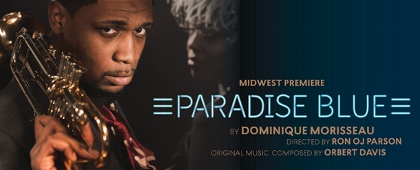
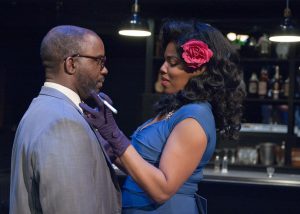
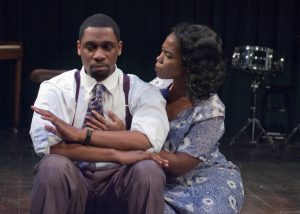
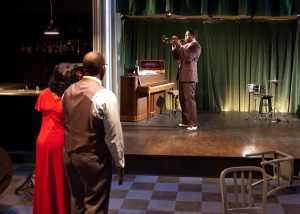
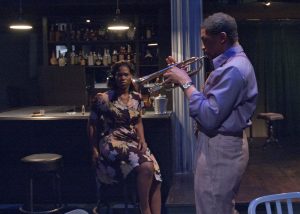
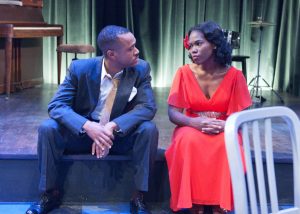
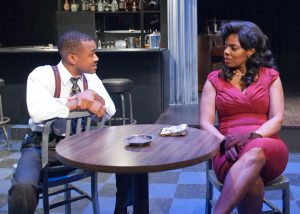
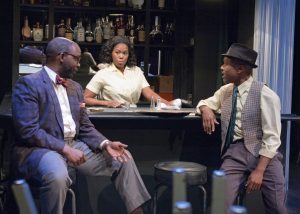
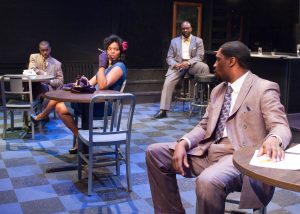

{ 1 comment… read it below or add one }
Insightful review of a smashing drama.